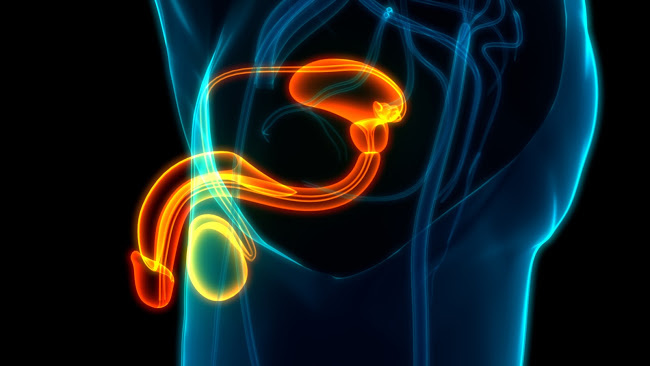
What Is Penile or Clitoral Numbness?

Sensation in one's sex organs can be important for experiencing sexual pleasure, reaching orgasm, and feeling sexually healthy. That's why it can be so distressing to lose these sensations, and it may lead to sexual dysfunction, such as anorgasmia (the inability to orgasm), erectile dysfunction, or other issues. Penile and clitoral numbness can both be described as a loss of sensation in the genital area. Each can be distressing in its own right, and each has their own set of implications for sexual health.
Penile Numbness
Penile numbness can be characterized by a loss of sensation in the testicles, perineum, or glans penis (skin at the tip of the penis). It may result in purplish blue skin, like a bruise, and may feel like coldness in the penis and testicles, or a burning, tingling, needle-like feeling. Sometimes this is temporary. For example, right after ejaculation, the penis may lose sensation for a few minutes. Other times, it may last longer and could be a sign of a problem.
A person may feel penile numbness due to injury to the pudendal or dorsal nerves. The pudendal nerve, located in the pelvis, provides sensory information to the reproductive systems, as well as other systems located in that pelvic region. Damage to these types of signal-sending (peripheral) nerves may cause loss of blood flow, pain, tingling or a pins-and-needles sensation (like if your arm “fell asleep”), and sometimes a loss of sensation in the surrounding area.
This nerve damage is potentially caused by situations such as riding a bike or from sitting for too long. Penile numbness may also be caused by general nerve problems from underlying conditions, such as Peyronie’s disease, diabetes, or multiple sclerosis. Prolonged penile numbness may cause certain ejaculatory or orgasmic disorders, and often erectile dysfunction.
Numbness may also be sex- or masturbation-related. For one, frequent masturbation with a tight grip, or death grip syndrome, may cause desensitization in the penis or friction burns. Aggressive sexual activity can also be harmful for the same reasons as aggressive masturbation, sometimes causing penile fracture or bruising. Sometimes numbness may be caused by general irritation like reactions to hygiene products or experiencing friction from clothes.
Healthcare professionals may suggest a variety of mild lifestyle changes if you are experiencing penile numbness. These may consist of reduced activity, taking short breaks throughout the day, adjusting seating position, standing more often, and sometimes surgery for profound nerve damage or injury.
Clitoral Numbness
Clitoral numbness is explained as the loss of sensation to the clitoris, with similar effects as penile numbness: tingling, pins-and-needles feeling, or lack of arousal. It can be caused by many of the same events as penile numbness, such as general irritation, underlying conditions, bike riding, or aggressive sexual activity. You may also experience a numbness immediately following orgasm for a few minutes. In rare cases, numbness may be caused by pudendal nerve damage, which disrupts blood flow.
Another reason for a loss of sensation may be clitoral atrophy. This can sometimes be attributed to a lack of frequent sexual activity for a prolonged period of time, inadequate blood flow, or hormonal changes. The clitoris may begin to thin or shrink, may appear pale or white, and the gland of clitoris may disappear under the clitoral hood. The resulting effects from clitoral numbness may be sexual distress, loss of libido (sex drive), sexual dysfunction, and sometimes pain in the region.
Healthcare professionals may recommend a few lifestyle changes for clitoral numbness, as well. This might include changes to sexual behavior, cardio exercise, pelvic floor physical therapy, hormonal treatments, or surgery.
Conclusion
It may be beneficial to speak with your partner about your concerns and discuss how they can support your healing. While it might be alarming to experience numbness in any of these areas, it’s important to remember that numbness may not always be serious. Often, you may experience numbness directly after orgasm or sexual activity. However, if you are experiencing a loss of sensation in your penis or clitoris, it is important to seek advice from a sexual health professional.
References:
- Amsterdam, A., & Krychman, M. (2009). Clitoral atrophy: A case series. The Journal of Sexual Medicine, 6(2), 584–587. https://doi.org/10.1111/j.1743-6109.2008.01044.x
- Holland, K. (2023, March 31). What is clitoral atrophy and how is it treated?. Healthline. https://www.healthline.com/health/womens-health/clitoral-atrophy#your-partner
- Mayo Foundation for Medical Education and Research. (2024, March 30). Peripheral nerve injuries. Mayo Clinic. https://www.mayoclinic.org/diseases-conditions/peripheral-nerve-injuries/symptoms-causes/syc-20355631
- MediLexicon International. (2023, January 9). Erectile dysfunction and nerve damage: Symptoms and more. Medical News Today. https://www.medicalnewstoday.com/articles/erectile-dysfunction-nerve-damage-symptoms#diagnosis
- MediLexicon International. (2024a, January 25). Clitoral atrophy: Causes, symptoms, and treatment. Medical News Today. https://www.medicalnewstoday.com/articles/clitoral-atrophy#contacting-a-doctor
- MediLexicon International. (2024b, August 19). Penile numbness: Causes, symptoms, and regaining sensitivity. Medical News Today. https://www.medicalnewstoday.com/articles/322694#treatments
- Numbness & tingling. Cleveland Clinic. (2023, August 21). https://my.clevelandclinic.org/health/symptoms/21015-numbness
- Pudendal neuralgia: Causes, symptoms & treatment. Cleveland Clinic. (2022, November 11). https://my.clevelandclinic.org/health/diseases/24438-pudendal-neuralgia





